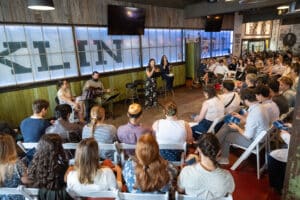-
15 February 2024

This Jewish Disability Acceptance, Awareness, and Inclusion Month (JDAIM), Federation’s Inclusion and Belonging Specialist, Rinat Kisin, is diving into our year-round work and deep partnerships as we seek to build an inclusive and accessible Jewish community with a focus on disability inclusion.
Rinat sat down with Alexandra Tureau, Managing Director of Federation partner Gather DC, to discuss disability inclusion in Jewish Greater Washington and the ways in which we can all work together to advocate and create a community of belonging and acceptance.
How does promoting disability inclusion within your organization contribute to fostering a more diverse and representative Jewish community for young adults?
At GatherDC, we think about Jewish community from a relational lens: how can our work bring people into deeper relationship with one another, with Gather, and with Jewish community and Jewish spaces? Gather’s ethos of meeting people where they are means physically, emotionally, and Jewishly. We focus on the whole person, and that has to take disability inclusion into account. Peoples’ identities are multifaceted, and we cannot expect Jews with disabilities to feel they can engage Jewishly if their needs are not being met. I hope that through our work and the spaces we create, people feel like they can show up as their whole selves and have the same opportunities to build meaningful connections to others and their Judaism.
I think a lot of people imagine physical disability when we have these conversations, but disability inclusion must also include all of the invisible disabilities. Through being in relationship with people, we’re honored to learn so much about them — not just what’s on the surface or obvious to the eye, but everything underneath that. And we want to respect that.
In what ways can an inclusive environment for individuals with disabilities enhance the overall sense of belonging for young Jewish adults in Greater Washington?
At GatherDC we think about relationships and community-building in a fractal model: start small and grow from there. If we can create spaces where individuals with varying identities can come together, connect with one another, develop their Jewish identities – all as individuals and as a collective – then we are closer to forming a true kehillah (community). As Rabbi Lord Jonathan Sacks, z”l, describes: a community where its members are different from one another, but they work together for a common purpose and shared vision.
The collective undertaking of community — and not just for young adults but for all of us — is about belonging, not despite our differences but because of them, in pursuit of that shared vision. Intentional cultivation of genuinely inclusive, open Jewish spaces builds the conditions for meaning-making through relationships, and we have seen time and time again that authentic one-on-one connection is the key to building that sense of community and belonging.
How can integrating disability awareness and inclusion empower young adults to become advocates for inclusivity and diversity in their broader communities?
As our communal spaces become more diverse and inclusive, as we build deep and authentic relationships with people of similar backgrounds and identities to us and people with completely different stories, histories, and identities than our own, the more able we are to show up for and build a Jewish space that is reflective and meets the needs of all Jews in our tent.
If we can do that in the Jewish community — and specifically in regard to disability awareness and inclusion — then people will be better attuned and positioned to effectively advocate for inclusive and diverse spaces across their worlds. Once one of the spaces you occupy becomes a space for true belonging, you can start to feel how your other spaces or communities are lacking. We’ve seen it happen at GatherDC!
When we’ve invested in disability inclusion education as a team, with staff members using their personal and professional development resources to deepen our knowledge and scope of understanding, it makes us think differently about the spaces we choose to host in. When we reallocate dollars and staff time to be able to support disability inclusion, and think more holistically about what a disability is and the various ways it affects someone’s life, including how they show up in Jewish community, that’s when we start to see change. Making those structural changes meant we started to see new faces showing up, people sharing more of their whole selves, and folks coming to our team to have conversations about navigating Jewish spaces with their disability. And it pushes us to be in even deeper relationship, to think creatively, and to learn from one another. We have seen that shift firsthand at GatherDC, and we should be working towards disability awareness and inclusion across all of our communities.
